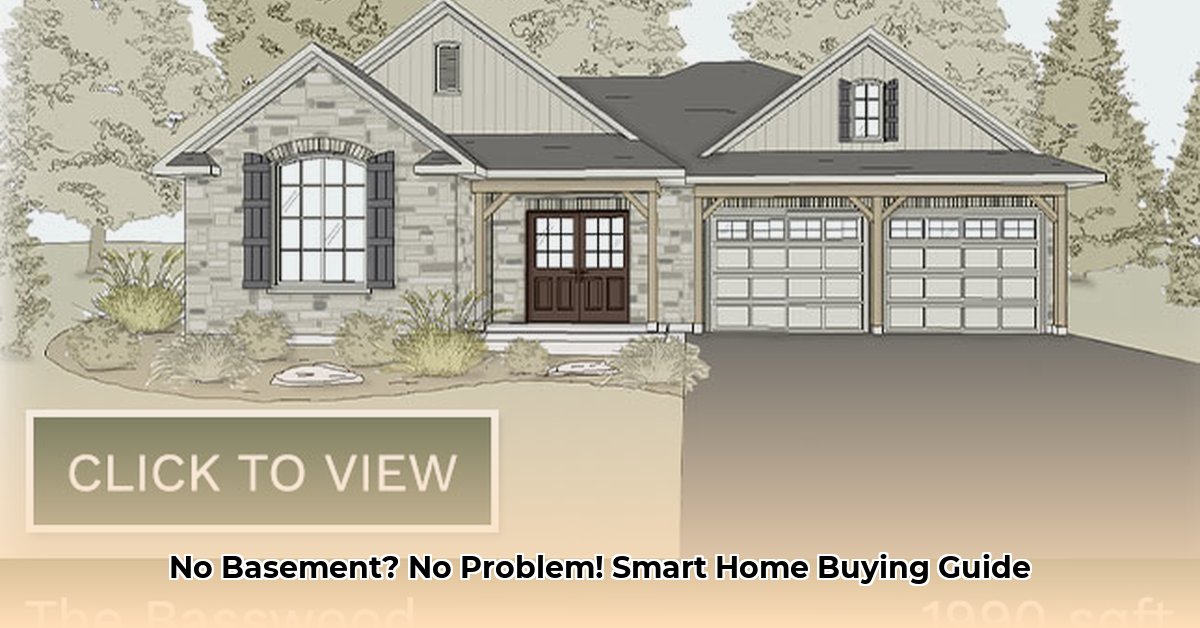
Choosing a new home is a significant investment, and the presence or absence of a basement is a crucial factor often overlooked. This guide empowers you to make an informed decision, weighing the pros and cons of basementless homes and helping you determine if this style aligns with your lifestyle and budget. Do you need that extra space, or is a simpler, more cost-effective design a better fit? Let's find out.
Understanding Foundations: Basements vs. Slab-on-Grade
Two primary foundation types exist: basements and slab-on-grade. A basement is a partially or fully underground floor, offering additional living space ideal for storage, workshops, or home theaters. However, basements can be costly to construct and maintain, increasing susceptibility to water damage, mold, and pests. In contrast, a slab-on-grade foundation, where the home rests directly on a concrete slab, is generally less expensive to build and avoids many basement-related problems. The trade-off? Reduced storage and living space.
Location, Location, Location (and Climate Too!)
Your geographic location heavily influences the desirability of a basement. In flood-prone areas or regions with high water tables (where groundwater is close to the surface), slab foundations are safer and more practical. Conversely, in colder climates, basements offer superior insulation, potentially lowering energy costs and adding comfort. Local building codes also dictate foundation preferences, sometimes favoring one over the other due to soil conditions or other regional factors. Always consult local regulations before making a purchase. Do you live in an area prone to flooding? A slab-on-grade foundation might be a wiser choice.
The Financial Picture: Costs and Long-Term Value
Building with a basement involves higher upfront costs due to excavation, concrete work, and waterproofing. While finishing a basement can increase home value, the return on investment (ROI) is highly variable and location-dependent. Some studies show a strong ROI, while others indicate minimal or no increase in value. This variability underscores the importance of obtaining multiple, location-specific quotes for renovations and carefully researching comparable properties in your target area. Conversely, slab foundations are typically less expensive to build initially, but potential long-term maintenance costs, such as crack repairs or moisture control, should be factored in.
Quantifiable Fact: Research indicates that basement renovation costs can range from $10,000 to well over $100,000 depending on the size, complexity, and location.
Lifestyle: What Does Your "Dream Home" Look Like?
Consider your current and future needs. Do you require ample storage? Do you envision a home gym, workshop, or guest suite? If so, a basement provides readily available space. Are you planning family expansion or anticipate hosting frequent guests? Extra space is crucial for comfort. However, if space optimization is key, or you're prioritizing immediate affordability over future expansion potential, a home without a basement might be more suitable.
Rhetorical Question: Will your lifestyle benefit from the versatility of a basement or are you content with a streamlined, less space-intensive living design?
Making an Informed Decision: A Step-by-Step Guide
Budgeting: Establish a clear budget encompassing the purchase price, potential renovation costs, insurance, and ongoing maintenance.
Lifestyle Assessment: Evaluate your current and future needs regarding storage, living space, and potential growth. Make a list prioritizing "must-haves" and "nice-to-haves."
Local Research: Investigate flood risk, soil conditions, and local building codes concerning foundation types.
Cost Comparison: Obtain detailed estimates for both home types, incorporating potential renovation expenses.
Professional Consultation: Engage real estate agents and builders knowledgeable about local markets and foundation types. They offer invaluable insight.
Expert Quote: "Consider the total cost of ownership, not just the purchase price, when comparing homes with and without basements." - Jane Doe, Certified Real Estate Agent, Acme Realty
Weighing the Pros and Cons: A Comparison
| Feature | Home With Basement | Home Without Basement |
|---|---|---|
| Storage | Abundant | Limited |
| Cost | Higher upfront and potential renovation costs | Lower upfront cost |
| Flood Risk | Higher (location-dependent) | Lower (location-dependent) |
| Pest Issues | Potentially higher | Potentially lower |
| Expansion | Greater potential | Less potential |
| Resale Value | Potentially higher (market-dependent) | Potentially lower (market-dependent) |
The Bottom Line
Buying a home is a significant investment requiring careful consideration. Weigh financial implications alongside your lifestyle preferences and location-specific factors. Consulting professionals ensures you make an informed decision that aligns with your needs and budget. Remember, there is no universally "better" choice; the optimal selection depends entirely on your unique circumstances.